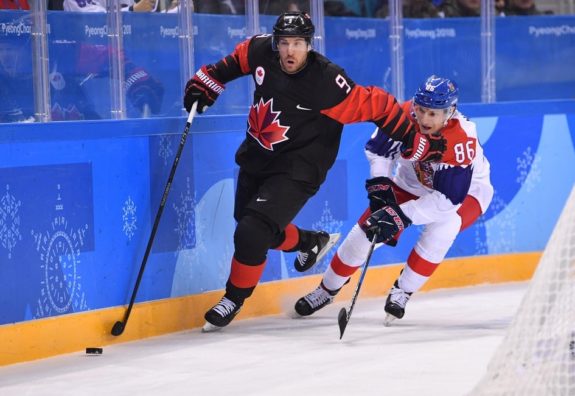The 2018 Winter Olympics in Pyeongchang, South Korea have come and gone. With the 2018 event complete, the focus of the winter sports world has turned towards preparations for the 2022 Beijing Olympics and the bidding process for the 2026 Winter Olympics.

Four cities are currently part of the International Olympic Committee’s “dialogue process” for the 2026 Olympics: Sion (Switzerland), Sapporo (Japan), Stockholm (Sweden)… and Calgary (Canada). Calgary’s bid, if successful, could carry with it some rather far-reaching implications for the National Hockey League.
The Olympic Landscape
As fondly remembered by many, Calgary hosted the Winter Olympics in 1988. Those games put the then-emerging city on full international display and, in part due to strong volunteerism and a big television contract, led to a rather large profit – the proceeds from the ’88 Olympics have been reinvested into the city’s legacy infrastructure and has led to Canada becoming a winter sports superpower.
However, the Olympics have changed a lot since 1988. The Olympics have become very expensive undertakings – a Forbes estimate pegs the 2018 games at $12.9 billion – and the proceeds for the television rights now flow through the IOC rather than the individual games, so it’s extremely tough for an Olympics to break even. As a result, fewer and fewer bids are coming in for each event.
IOC president stokes hopes of Calgary hosting 2026 Olympics https://t.co/RJK3jA2ZaM
— CBC News (@CBCNews) February 26, 2018
Calgary’s bid for 2026 comes at a very interesting time for the IOC. Faced with dwindling bid interest due to skyrocketing costs, the IOC has seemingly embraced the Agenda 2020 reforms focused on getting Olympic costs down by leveraging existing infrastructure. Speaking to Postmedia’s Sammy Hudes, sports economist Moshe Lander pointed to several factors potentially pushing the IOC towards Calgary in 2026:
‘It’s a highly desirable exercise for the IOC,’ said Lander, of returning the Games to the 1988 host city. ‘Legacy is No. 1, North America No. 2, the time zone No. 3. The games in Pyeongchang are going to be a disaster for advertisers, for the networks that bid billions to broadcast it. To most of the people in North America, everything interesting . . . is going to happen in the middle of the night, not in prime time.’
The Pyeongchang games ended up being the lowest-rated Winter Olympics in history and the 2020 Summer Games (Tokyo) and 2022 Winter Games (Beijing) are also slated to be held in Asia, which means that the major events will take place in the middle of the night for the key North American audience. If rehabilitating ratings and reforming costs are the aim, Calgary’s bid is well-positioned for the IOC’s current needs.
Should the 2026 Calgary bid prove successful, there will be major implications for the hockey world. Those implications basically fall into three main categories: Calgary’s new arena, the NHL’s international agenda, and the upcoming Collective Bargaining Agreement negotiations.
Calgary’s Arena Situation
As has been well-documented, the City of Calgary and the Calgary Flames have been engaged in protracted (and more recently bitter) arena negotiations for some time. A successful 2026 bid would likely see the men’s hockey tournament played at the Scotiabank Saddledome and one other venue, ideally a new Calgary arena.
Independent of the many factors keeping them in town – among them the Rogers television deal, a sweetheart lease for the Saddledome, and a voracious local hockey market – it seems incredibly unlikely that the Flames would relocate from a city that’s hosting an Olympics. Absent the Flames, the City would be able to project their messaging about a failed arena deal and the team would be painted as an unreasonable party if a deal wasn’t done by then. A successful bid would also potential bring with it an influx of government infrastructure cash, which could help fund the construction of a new arena in an effort to keep 2026’s venues clustered and keep security costs down. Either way, given the stakes, it seems likely that a successful bid would bring the Flames and the City back to the bargaining table with a renewed focus.
Would a new arena help Calgary land the Olympics? Based on how the Agenda 2020 reforms impact bid evaluation and makes building new venues expressly for the Olympics undesirable, probably not. But given the various factors in play, an Olympics could get Calgary a new arena.
The NHL’s International Calendar
It’s no secret that Gary Bettman isn’t a huge fan of the Olympics, particularly shutting down the NHL for two weeks while the best players on his league’s member clubs risk injury – with little compensation to the owners. The NHL dusted off the World Cup of Hockey in 2016 – returning from a 12-year hiatus – and the results were a bit mixed. In part due to the prestige of a gold medal and the recent history behind the tournament, the Olympics still seem to be held in higher regard – many players expressed disappointment that the NHL didn’t participate in South Korea.

The next World Cup is tentatively slated to be held in Sept. 2020, but that’s dependent on the approval of the NHLPA. By coincidence, the 2020 tournament would need to be set up by the fall of 2019 – around the time that the NHL and NHLPA each have a CBA opt-out and when the winning bid for the 2026 Olympics is announced. If Calgary is awarded the 2026 Olympics, it seems a safe bet that the NHLPA will put the NHL’s feet to the fire regarding enshrining Olympic participation in the new CBA and engages in some horse-trading in regards to the World Cup. An Olympic hockey tournament in an NHL city with NHL players not involved seems incredibly unlikely, while the ratings and ticket draw of such a tournament would give the IOC a ton of incentives to broker a deal with the NHL regarding participation.
The Upcoming CBA Negotiations
As mentioned in the previous section, the NHL and NHLPA each have a CBA opt-out in the fall of 2019 which would trigger the current CBA to expire in Sept. 2020. That date is important because that’s the tentative start date for the proposed Seattle expansion team and the tentative move-in date for the New York Islanders in their new Belmont Park arena. The NHLPA’s membership has bristled about escrow and would probably like to go back to the Olympics, while the NHL has some significant incentives to avoid a work stoppage in 2020. If Calgary gets the 2026 Olympics, the NHLPA has a ton of leverage – arguably more than they’ve had in decades – heading into the latest round of CBA negotiations.
Something as otherwise simple as an Olympic bid, if successful, could have huge ramifications for the NHL and the wider hockey world. It could trigger an injection of funding that gets Calgary’s new arena built, spell the return of NHL players to the Olympic tournament, and hand the NHLPA a lot of additional leverage as they head into CBA negotiations.